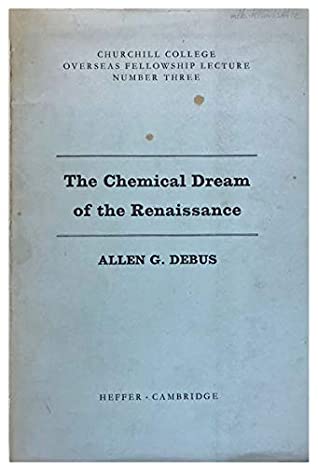

 |

|

The average rating for The chemical dream of the Renaissance based on 2 reviews is 3 stars.
Review # 1 was written on 2020-03-13 00:00:00 Dick Head Dick HeadA very accessible, non-fiction telling of the epic journey and transmutation of the collective human intellect through the ages. The book guides us through the labyrinth of dead ends and discoveries from Thales of Miletus in ancient Greece, through Mendeleyev of mid 19th century Czarist Russia that precipitated the identification and classification of the known elements. Though this may sound boring - it is not. Strathern illuminates all of the major characters, their lives, and their intellectual entanglements in myth, religious dogma, superstition, and the specially persistent influences of alchemy that took chemistry millennia to shed like an emergent butterfly from its chrysalis. The title of this book is misleading, if from it you assume the book is primarily about Mendeleyev - far from it. In this book of just under 300 pages, only the prologue and last 32 pages concern him. This, however, does not detract from the amazing story behind the distillation of modern chemistry out of the quagmire of beliefs and false starts - era after era - finally culminating in Mendeleyev's periodic table of the elements and the birth of modern chemistry. Strathern conjures up from the dusty past, and richly fleshes out for us, the long line of extraordinary characters, their lives, influences, and contributions that eventually produced modern chemistry that has so profoundly shaped the modern world. Very much worth reading. |
Review # 2 was written on 2012-07-23 00:00:00 Steven Breck Steven BreckThis is a very good book. It not only made me understand the shift from alchemy to chemistry, the search for elements and the more or less bizarre people involved in both but also what is the trouble with most popularized accounts that claim to be about the history of science. Strathern is both a historian and a scientist. Most other authors are only half historians and half scientists, at least when they set out to write their books which turn out to be more or less sloppy products. Strathern is anything but sloppy. He injects something to his account that is rarely seen these days: wisdom. He is able to situate himself in a person's life in its historical context without making a fuss about it. That approach results in delightful and insightful passages as this: "Fortunately [Mendeleyev's] wife proved an imaginative and resourceful woman. She wisely chose to spend her time on the estate at Tver, except when her husband arrived there from St Petersburg, when she and the children would depart from the Mendeleyev town residence. In this way the marriage managed to survive, without the cohabitation which is the ruin of so many relationships." Now that Imitation Game about Alan Turing is still in the theatres, the reader appreciates all the more what singular characters it takes to make significant advances in science or any other human endeavour for that matter. The French chemists Lavoisier was the only one that Strathern portrayed as normal but he makes much of the fact that that did not spare Lavoisier from the guillotine. Ironically, the judge sent him to his death by saying that the revolution does not need scientists. |
CAN'T FIND WHAT YOU'RE LOOKING FOR? CLICK HERE!!!